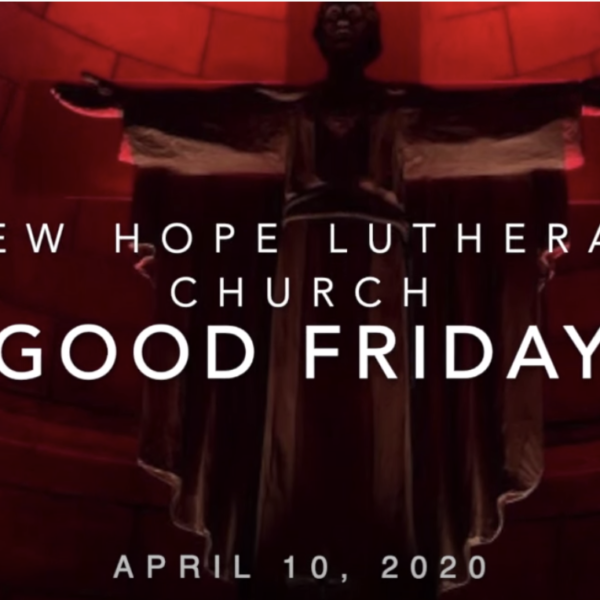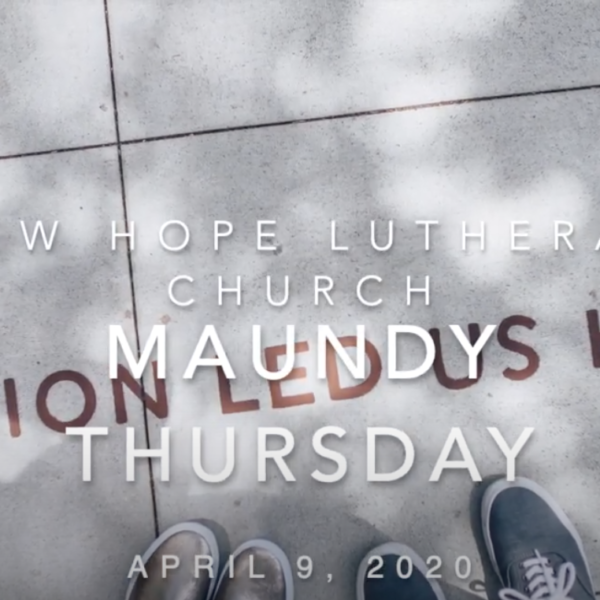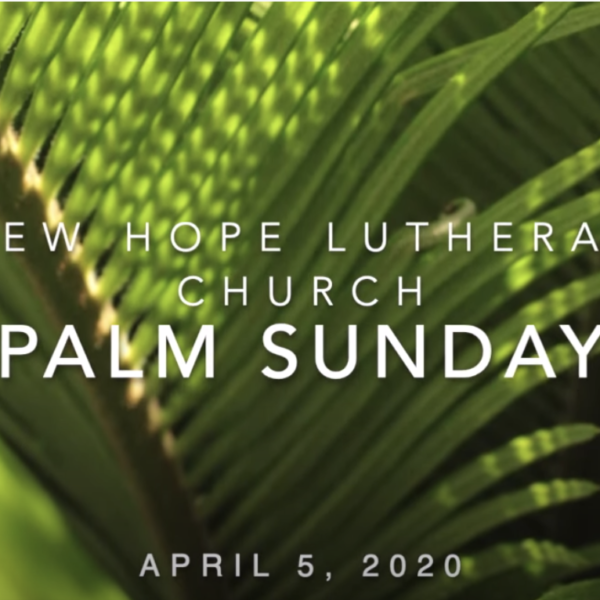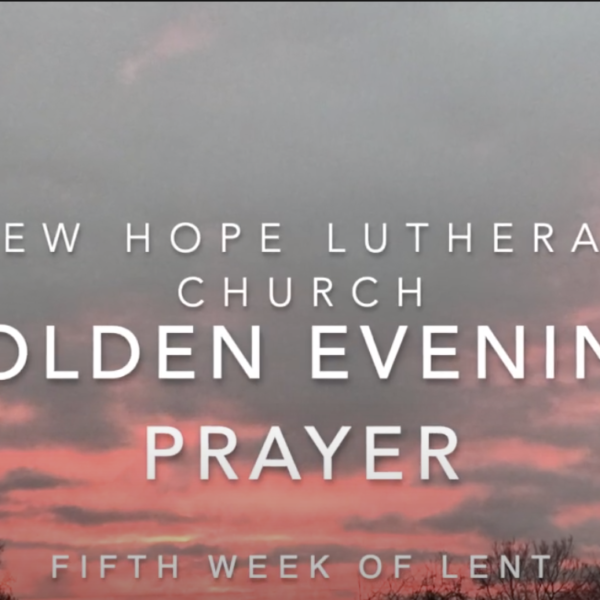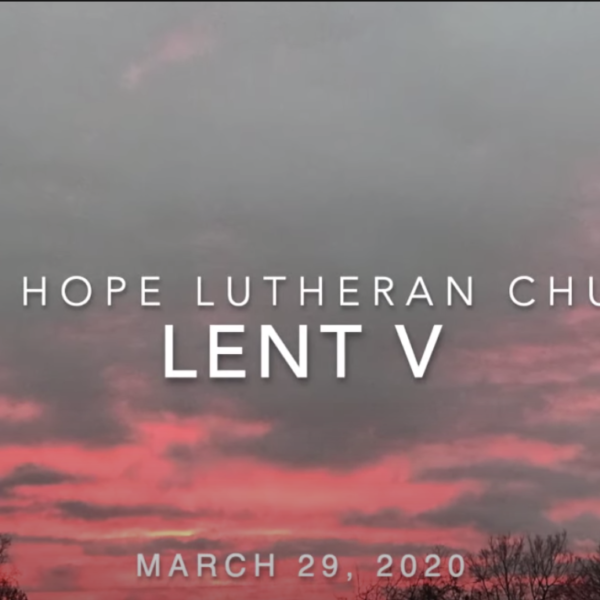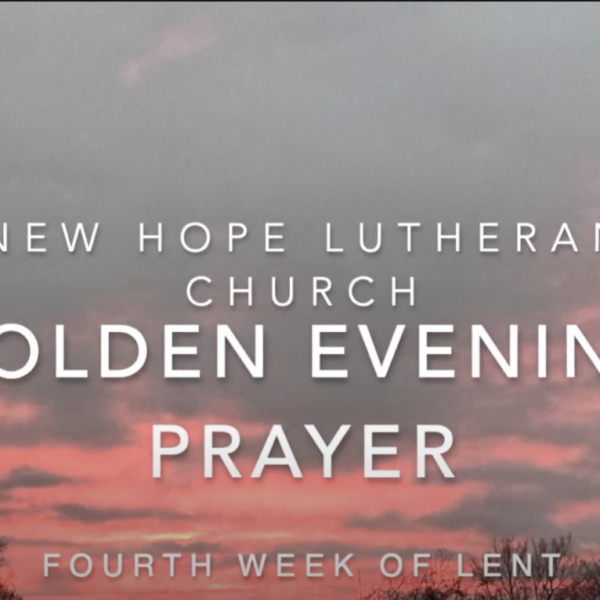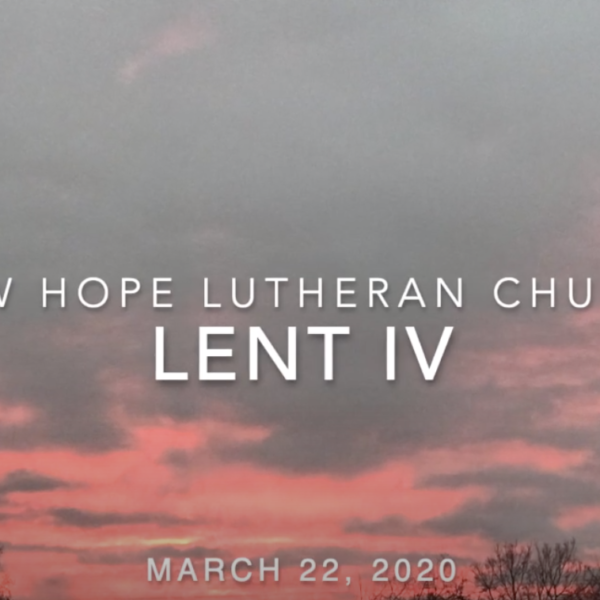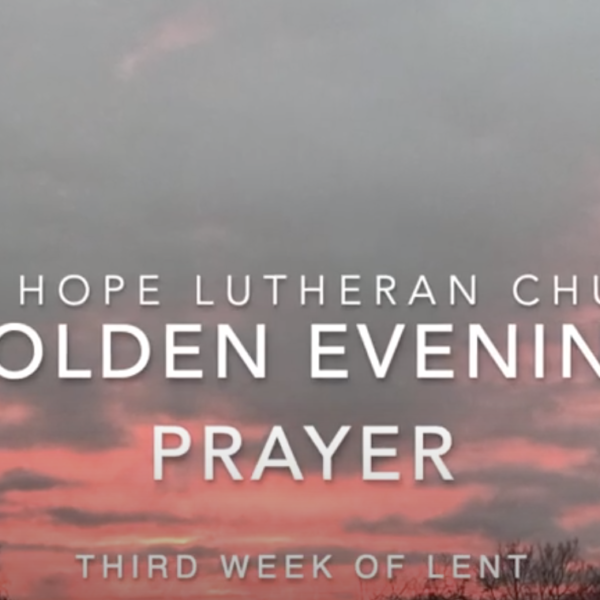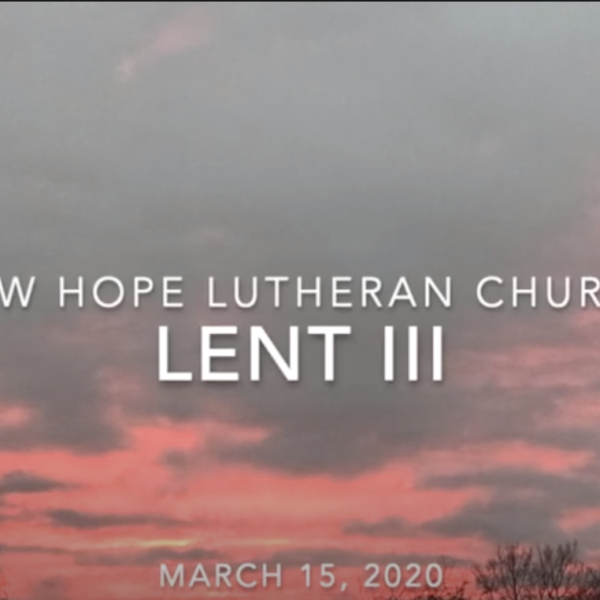John 11:1-45
1 Now a certain man was ill, Lazarus of Bethany, which was the village of Mary and her sister Martha. 2 Mary was the one who anointed the Lord with perfume and wiped his feet with her hair; it was her brother Lazarus who was ill. 3 So the sisters sent a message to Jesus, “Lord, the one whom you love is ill.” 4 But when Jesus heard it, he said, “This illness does not lead to death; rather it is for God’s glory, so that the Son of God may be glorified through it.” 5 Accordingly, though Jesus loved Martha and her sister and Lazarus, 6 after having heard that Lazarus was ill, he stayed two days longer in the place where he was.
7 Then after this he said to the disciples, “Let us go to Judea again.” 8 The disciples said to him, “Rabbi, the Judeans were just now trying to stone you, and are you going there again?” 9 Jesus answered, “Are there not twelve hours of daylight? Those who walk during the day do not stumble, because they see the light of this world. 10 But those who walk at night stumble, because the light is not in them.” 11 After saying this, he told them, “Our friend Lazarus has fallen asleep, but I am going there to awaken him.” 12 The disciples said to him, “Lord, if he has fallen asleep, he will be all right.” 13 Jesus, however, had been speaking about his death, but they thought that he was referring merely to sleep. 14 Then Jesus told them plainly, “Lazarus is dead. 15 For your sake I am glad I was not there, so that you may come to trust. But let us go to him.” 16 Thomas, who was called the Twin, said to the other disciples, “Let us also go, that we may die with him.”
17 When Jesus arrived, he found that Lazarus had already been in the tomb four days. 18 Now Bethany was near Jerusalem, some two miles away, 19 and many of the Judeans had come to Martha and Mary to console them about their brother. 20 When Martha heard that Jesus was coming, she went and met him, while Mary stayed at home. 21 Martha said to Jesus, “Lord, if you had been here, my brother would not have died. 22 But even now I know that whatever you ask of God, God will give you.” 23 Jesus said to her, “Your brother will rise again.” 24 Martha said to him, “I know that he will rise again in the resurrection on the last day.” 25 Jesus said to her, “I am the resurrection and the life. Those who trust in me, even though they die, will live, 26 and everyone who lives and trusts in me will never die. Do you believe this?” 27 She said to him, “Yes, Lord, I believe that you are the Messiah, the Son of God, the one coming into the world.”
28 When she had said this, she went back and called her sister Mary, and told her privately, “The Rabbi is here and is calling for you.” 29 And when Mary heard it, she got up quickly and went to him. 30 Now Jesus had not yet come to the village, but was still at the place where Martha had met him. 31 The Judeans who were with Mary in the house, consoling her, saw Mary get up quickly and go out. They followed her because they thought that she was going to the tomb to weep there.
32 When Mary came where Jesus was and saw him, she knelt at his feet and said to him, “Lord, if you had been here, my brother would not have died.” 33 When Jesus saw her weeping, and the Judeans who came with her also weeping, he was greatly disturbed in spirit and deeply moved. 34 He said, “Where have you laid him?” They said to him, “Lord, come and see.” 35 Jesus began to weep. 36 So the Judeans said, “See how he loved Lazarus!” 37 But some of them said, “Could not he, the one who opened the eyes of the blind man have kept this man from dying?”
38 Then Jesus, again greatly disturbed, came to the tomb. It was a cave, and a stone was lying against it. 39 Jesus said, “Take away the stone.” Martha, the sister of the dead man, said to him, “Lord, already there is a stench because he has been dead four days.” 40 Jesus said to her, “Did I not tell you that if you trusted, you would see the glory of God?” 41 So they took away the stone. And Jesus looked upward and said, “Father, I thank you for having heard me. 42 I knew that you always hear me, but I have said this for the sake of the crowd standing here, so that they may believe that you sent me.” 43 When Jesus had said this, he cried with a loud voice, “Lazarus, come out!” 44 The dead man came out, his hands and feet bound with strips of cloth, and his face wrapped in a cloth. Jesus said to them, “Unbind him, and let him go.”
45 Many of the Judeans therefore, who had come with Mary and had seen what Jesus did, believed in him.
—————
Please pray with me this morning, church:
God of resurrection,
Call us out from our graves.
Unbind us.
In the midst of our fears and worries and anxieties and doubts,
Help us to breathe.
Amen.
—————
Church, how are we doing?
If you’re keeping score at home, we’re on Day 4 of the Fort Bend County “Stay Home to Save Lives” order. Day 15 of CDC-recommended social—or as I prefer to call it, physical—distancing. (Because really the idea is to stay physically distant, but in truth, we really must maintain our social connections to one another as best we can…) And Day 20-something of feeling truly under threat from this COVID-19 pandemic…
So how’s your quarantine going, church?
If you’re like me, quite honestly, you feel a bit like Lazarus…stuck in a tomb. Whether the tomb is your house, or the gazillion things you find on your to-do list, or even if it’s just the threat of this pandemic that has you feeling like you’re holed up and sealed off with only your own fear and anxiety to keep you company…I bet the tomb feels real to you this morning. I bet you can imagine what being sealed off in darkness looks like and feels like.
And…depending on how seriously you’re taking your hygiene habits during these days of quarantine and distancing and isolation from others…because let’s be honest, who are you really going to interact with during a quarantine??…depending on your habits during this quarantine, maybe you feel, or at least smell, like Lazarus…like you’ve been dead for 4 days… I love the King James Version’s translation of Martha in verse 39. The KJV says, “My Lord, he stinketh…” I wonder if your new co-workers would say that about you. “My Lord, they stinketh…”
Seriously though, take a shower. Stay clean and healthy and hydrated. And for the love of all things holy, wash your hands!
The thing is, I think we know very well what a tomb feels like these days. Maybe you feel like the dry bones from Ezekiel—dried up and like you’ve lost all hope…cut off completely… Uhh, hello…? Quarantine and isolation, anyone…? I think we know what that feels like. I think we’re acquainted with the grief shown by Martha and Mary, and even Jesus. I think we can identify with that pain. If not the grief and pain just yet, certainly the fear and anxiety…which lead to grief and pain…they’re sisters, you see?
I mean, do you hear the agony and pain in Martha’s and Mary’s words? “Lord…if you had been here…our brother would not have died..” If you had come when we first sent word…we told you he was sick…what did you think was going to happen…?
I feel like I’m always saying that this is my favorite bible story or that’s my favorite bible story…but I really like this story from the gospel of John. Because talk about complicated family dynamics. Mary, Martha, and Lazarus…they were really close with Jesus, the author writes that Jesus loved them, they were all really close friends. And so when Martha lobs this accusation at Jesus, it didn’t just glance off. It couldn’t have. I mean, these were words meant to wound and injure, and I think they probably did. “Lord, if you had been here, my brother would not have died.” The meaning behind these words being, of course, “How dare you walk up like everything’s ok. We told you Lazarus was dying and you stayed where you were and you didn’t come here immediately, and Lazarus died because of you.”
How often do we use words that are meant to wound and injure with our family members? How often do we use words to try and make others feel as hurt and as pained as we do?
As we live into our new normal of sheltering at home and severely restricting our interactions with others, do you find yourself getting short with your family members? Are you managing your anxiety and fear so that you don’t put all that stuff on your family who you suddenly find yourself spending a lot more time with?
And so, it’s in the midst of this grief and anger and pain, that Mary and Martha and Jesus and all the folks gathered with them, they go to the tomb and Jesus stands outside it, and then the shortest verse in the Bible, John 11:35: “Jesus wept.”
Over and over again, the gospel of John tries to convince you that Jesus has it all together and there’s this great plan and Jesus knows exactly what he’s doing and exactly what he has to do…but here, in this moment, you get a peek behind the curtain. This death—Lazarus’ death—pains Jesus. He was greatly disturbed…deeply moved… Jesus has to be wondering if what Martha and Mary said was true…”If I would have been here…would Lazarus still be alive?”
That’s the thing about pain, we’re pain-averse creatures…we don’t like it. And so when we experience pain and hurt, we feel very strongly that the ones who caused us this pain and hurt should feel exactly like we feel…worse even, they should feel worse than we do.
When we operate out of a place of pain, we seek to transmit that pain and put it on others. The same is true of fear and anxiety…when we don’t manage them well, we bring others into our cyclone of fear and anxiety, we actually catch others up in this really damaging spiral, and it ends up hurting them.
So how do we manage these things? How do you make sure that when you’re feeling well acquainted with the tomb, when you feel like your fear and anxiety have kept you buried for 4 days or even longer, how can you be sure not to catch others up in this?
Well, for starters, I think breathing is essential.
Fort Bend County’s stay-at-home orders explicitly mention that getting outside and going on walks are not prohibited. In fact, they’re encouraged. It’s the breath—God’s breath—that gives life to the dry bones in Ezekiel. It’s the wind…the Hebrew word Ruach—interestingly Ruach means both wind and breath and spirit—it’s God’s breath…that will restore life to your worn out and dried up bones. Go outside and breathe deep. Take in the spring pollen. Let it fill up your eyeballs and nostrils. Let it fill up your lungs. Notice your breath.
Unbind yourself. Lazarus didn’t come out of the tomb looking like a spring chicken, and he certainly didn’t smell like one. Jesus said, “Unbind him…and let him go…” Church, cast off your grave-clothes. Loosen and shake off those things that bind you up, those things that keep you locked away and sealed up in your graves. Set down those things that are not yours to carry. Lighten your load.
And connect. Be drawn together like muscles and tendons and sinews laid upon bones that are being joined back together. We keep emphasizing connection and cultivating and nurturing these relationships, because, by God, they’re important. We need people who love us…who deeply love us…who will call us out of our graves. Who will help pull us out of the dark places we find ourselves…who will help unbind and loosen our grave clothes…who won’t care too much that we stinketh…but who will lovingly encourage us to go take a shower and wash our hair. It’s the point of all these check-ins we’ve scheduled and the phone calls and texts I’m encouraging you to make and send…because we are connected, and I need you to realize that.
I need you to trust me that this, too…being and staying connected…is vital to your health and well-being.
Call someone.
Text them.
Reach out.
Join our Zoom chats.
Go outside. Walk.
Wave to your neighbor from at least 6 feet away.
You are the body the Christ…and we are being broken open for the sake of the world.

